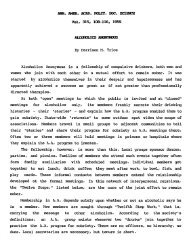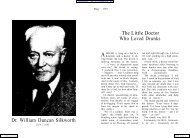with special reference to alcoholism surrender versus ... - Silkworth.net
with special reference to alcoholism surrender versus ... - Silkworth.net
with special reference to alcoholism surrender versus ... - Silkworth.net
Create successful ePaper yourself
Turn your PDF publications into a flip-book with our unique Google optimized e-Paper software.
apparent yielding. It is only when a real <strong>surrender</strong> occurs that compliance is knocked out of the<br />
picture, freeing the individual for a series of wholehearted responses -- including, in the alcoholic,<br />
his acceptance of his illness and of his need <strong>to</strong> do something constructive about it.<br />
Enough has been said, it would seem, <strong>to</strong> show the significance and the importance of<br />
understanding the relationship between compliance and the ability <strong>to</strong> <strong>surrender</strong> and accept. They<br />
are in complete opposition. As long as the former controls reactions, there can be no wholehearted<br />
acceptance, only the halfhearted kind which is admittedly not sufficient. Results of real value can<br />
only come about when the compliant reactions have been successfully dissipated.<br />
No Easy Road <strong>to</strong> Understanding<br />
Some will ask how this can be brought about. The answer, insofar as I have been able <strong>to</strong><br />
formulate it, is long, involved and rather hazy. Experience shows that through psychotherapy the<br />
dominance of compliance over the unconscious can slowly be superseded, and that through the<br />
A.A. experience compliance can be temporarily and sometimes permanently blotted out. There does<br />
not appear <strong>to</strong> be any easy road <strong>to</strong> real understanding of this problem.<br />
The preceding materials can now be summed up. It was pointed out that in an earlier article<br />
on the phenomenon of <strong>surrender</strong>, the tie of <strong>surrender</strong> <strong>to</strong> acceptance had not been sufficiently<br />
stressed. It was also pointed out that the concept of acceptance is freely talked about but rarely if<br />
ever made an object of study. Some observations regarding the nature of acceptance were<br />
reported and it was shown <strong>to</strong> contain two possible reactions which we called wholehearted<br />
acceptance and halfhearted. It was then demonstrated how halfheartedness and compliance were<br />
closely allied. The nature of compliance was next discussed and, lastly, the antipathetic relationship<br />
between compliance on the one hand and <strong>surrender</strong> and acceptance on the other.<br />
This is a long and rather circui<strong>to</strong>us route <strong>to</strong> the point of this paper, namely, that <strong>surrender</strong> is<br />
essential <strong>to</strong> wholehearted acceptance and that unconscious compliance, which is a halfway<br />
<strong>surrender</strong>, can be a vital block <strong>to</strong> genuine <strong>surrender</strong>. It was then pointed out that alcoholics<br />
frequently show marked unconscious compliant trends which not only help <strong>to</strong> explain some<br />
puzzling aspects of their behavior but also account for their frequent inability <strong>to</strong> respond<br />
meaningfully <strong>to</strong> treatment. Since the presence of these trends has been more clearly recognized,<br />
the response of many patients <strong>to</strong> therapy has been considerably more satisfac<strong>to</strong>ry. These<br />
considerations have been presented in the hope that others also may find that a recognition of the<br />
processes of <strong>surrender</strong>, acceptance and compliance can be a source of help in tackling the alcoholic<br />
psychotherapeutically.<br />
Reference:<br />
1. Sillman, L.R. Chronic <strong>alcoholism</strong>. J. nerv. ment. Dis. 107: 127-149,1948.<br />
2. Tiebout, H.M. Therapeutic mechanisms of Alcoholics Anonymous. Amer. J Psychiat. 100:468-<br />
473,1944.<br />
3. Tiebout, H.M. The act of <strong>surrender</strong> in the therapeutic process. With <strong>special</strong> <strong>reference</strong> <strong>to</strong><br />
<strong>alcoholism</strong>. Quart. J. Stud. Alc. 10: 48-58, 1949.<br />
4. Grayson, M. Concept of "acceptance" in physical rehabilitation. J. Amer. med. Ass. 145-<br />
.893-896,1951.<br />
5. Alcoholism Treatment Digest. Alcoholics Anonymous. III. Sociological features. Conn. Rev.<br />
Alcsm 3-.39--40,1952.<br />
6. Kubie, L.S. Practical and Theoretical Aspects of Psychoanalysis. New York; International<br />
Universities Press; 1950.















